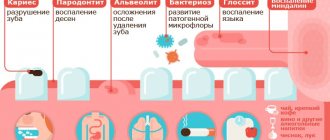Main nuances
“Bad breath is scientifically called “halitosis.” It can be physiological and pathological. In the first case, they usually talk about the “aroma” that appears in the morning and disappears after morning hygiene procedures. In the second case, the appearance of such a symptom has certain medical reasons,” says Evgenia Parshina. As the immunologist notes, smoking can, for example, influence the appearance of bad breath.
Among the main causes of halitosis is poor oral hygiene, when a person does not properly care for his teeth. It can also be caused by tooth decay or plaque on the tongue. The problem can also appear, as the immunologist notes, with chronic tonsillitis.
Question answer
Why does my breath smell bad in the morning? Also often the problem is caused by diseases of the gastrointestinal tract, for example a disease such as GERD (gastroesophageal reflux disease). Another reason could be the presence of Helicobacter pylori bacillus in the human body, says the immunologist.
Unpleasant odors from the mouth can be felt by a person suffering from diseases of the nasal cavity, which are accompanied by postnasal drip, as well as swelling of the mucous membranes and inflammation of the adenoids in children. “In children, by the way, an unpleasant smell from the nose can also appear against the background of foreign objects in the nose, which can remain in the nasal cavity for a long time,” says Evgenia Parshina.
Treatment
If the doctor has diagnosed a pathology that causes the ammonia smell and unpleasant taste, he will select a specific course of treatment. When started on time and properly selected, therapy usually shows good results.
READ ALSO: how to get rid of the taste of alcohol in the mouth? In most cases, to eliminate unpleasant symptoms, it is recommended to take solutions and use anti-inflammatory and antiseptic aerosols.
| A drug | Release form | Application | Note |
| Hexoral | Solution | Rinse your throat and mouth with 15 ml of undiluted solution 2 times a day for 0.5 minutes | Contraindicated in children under 3 years of age and with hypersensitivity to components |
| Aerosol | Spray into the throat and oral cavity 2 times a day for 2 seconds | ||
| Stopangin | Solution | 2 times a day after meals, rinse the throat and mouth with 15 ml of undiluted solution for 0.5 minutes | Contraindicated in children under 8 years of age, with individual intolerance, persons suffering from atrophic type dry pharyngitis |
| Spray | Spray into the throat and oral cavity 2 times a day after meals | ||
| Chlorhexidine Bigluconate | Solution | Rinse your mouth three times a day with a solution diluted with water according to the instructions. | Use with extreme caution in children only on the recommendation of the attending physician. |
Diabetes
For example, Evgenia Parshina notes that with diabetes, a person can smell a fruity or apple aroma from himself. A similar manifestation is observed when following, for example, a keto diet. The smell of diabetes is quite characteristic, it is similar to the aroma of soaked, fermented apples and resembles acetone. In people suffering from diabetes, there is a sharp increase in blood glucose levels, and ketone bodies begin to be released. Under starvation conditions, cells begin to actively use fats and proteins, including those stored for future use by the body, and when they break down, acetone begins to appear.
Causes
The pungent odor of acetone from the mouth, like ammonia, can be caused by poor diet, insufficient brushing of teeth, smoking,
drinking alcohol or prolonged fasting. But these factors are short-term. When you change your lifestyle, the microflora of the oral cavity is quickly restored, and the unpleasant ammonia odor disappears.
There are also deeper problems that indicate numerous pathologies. These may include kidney disease and endocrine disorders. If the smell persists for a long time, it is recommended to undergo an examination and tests. Most often, an increase in breakdown products with the release of ammonia causes diabetes mellitus, thyrotoxicosis and insufficient kidney function.
Diabetes
Pathology is divided into several types. The basis of the disease is a violation of the processing of glucose in the blood, carried out by insulin. When there is insufficient production of the hormone or the inability of cells to perceive glucose, an increase in blood sugar occurs. High concentrations of the substance can be dangerous for the patient. Untimely glucose control causes hospitalization. For type 2 diabetes, regulating drugs are prescribed in tablets. The first type requires constant injection of insulin.
With mild diabetes, the smell of ammonia is not too noticeable. Sometimes people live with it for many years without even thinking that they have diabetes. Frequent ailments and deterioration in well-being, which are attributed to other factors, become reminders of pathology. Sometimes the disease develops rapidly; with a sharp increase in blood sugar, a strong smell of ammonia is detected from the oral cavity. The mechanism of its formation is quite simple. Cells need to make up for the energy deficit that they do not receive from glucose. The active process of fat processing begins. When they break down, they form glucose and acetone. Ketone bodies increase in the blood, acting with their toxins on all organs and tissues. In this case, the smell of ammonia appears through the mouth, skin or urine.
In addition to the smell, there are other symptoms that indicate diabetes. The patient is often thirsty at night, urination increases and becomes more frequent. The skin turns pale and the heart beats faster. The patient may experience itching all over the body. Find out about the causes and treatment of fecal odor from the mouth here.
Untreated diabetes can cause many complications, including death. An endocrinologist should monitor the course of the disease.
Kidney diseases
The smell of ammonia from the mouth is noticeable in various pathologies of paired organs. This may be pyelonephritis, inflammation of the renal tubules, nephroptosis and other diseases. At the initial stage, the smell of ammonia does not appear, but if the kidneys are significantly impaired, the breakdown products are not excreted in the required quantity. This usually occurs due to improper treatment or progression of pathologies. Constant intoxication contributes to the release of ketone bodies and other harmful substances into the blood. Find out about the causes of white plaque in the mouth in adults in this material.
Usually, the smell of ammonia from the mouth is accompanied by various urinary disorders:
- increase, decrease in daily urine output or anuria;
- the occurrence of pain in the lumbar region;
- impurities in the urine, changes in transparency, blood;
- elevated body temperature, constant malaise.
Impaired kidney function can lead to serious deterioration of the patient's condition.
Thyrotoxicosis
Pathology refers to a hormonal disorder when the body significantly increases the production of thyroid-stimulating hormones. She talks about enhancing the functionality of the thyroid gland. Thyrotoxicosis is not always a consequence of serious disorders. Sometimes it appears during pregnancy when the body adjusts to bearing a fetus. But with any excess production of these substances, poisoning or intoxication of the body occurs. This link will tell you what geographic language is in adults.
Thyrotoxicosis enhances metabolism and vital processes. In patients, the ammonia odor from the mouth is accompanied by a feeling of heat, and blood rushes to the upper part of the body. Hair becomes thin and brittle and begins to fall out profusely.
In the absence of treatment, increased production of hormones progresses, and mental disorders are observed. The patient becomes easily excitable, fussy, a good mood is constantly replaced by apathy and tearfulness.
Kidney problems
“Another chronic disease that can lead to the appearance of an unusual odor is kidney failure,” says Evgenia Parshina. Thus, with diseases of the urinary system, for example nephrosis, pyelonephritis, etc., manifestations of the smell of ammonia may be observed. Usually this kind of smell appears already in the terminal stage. The mechanism by which the odor appears is that the main source of ammonia is the catabolism of amino acids and the breakdown of other nitrogen-containing compounds in tissues, including the kidneys. An imbalance leads to the accumulation of a substance in the blood.
Salty taste. What diseases does this symptom indicate? More details
Ammonia odor from the breath due to fatigue, medications and diets
The smell of ammonia can be associated with excessive exhaustion, fatigue, hormonal changes, adherence to certain diets - during fasting, bacteria settle more on the teeth and tongue. Causes also include a disorder of the immune system and the use of various medications.
Halitosis occurs, in particular, when taking drugs to treat blood pressure, antihistamines, antidepressants, which cause dry mouth. Dryness is known to be associated with decreased saliva production, which is a significant contributor to odor. Some medications release chemicals that have a characteristic odor. The use of antibiotics or inhaled corticosteroids can, in turn, cause changes in the microflora in the mouth, which affects breathing.
Hyperthyroidism
The smell of iodine from the mouth also indicates problems in the body. Usually, when such a signal appears, doctors send the person to be checked for problems with the thyroid gland, in particular hyperthyroidism. It is this gland that is associated with iodine. When the body has a problem with the production of hormones, it does not have enough capacity to work properly and dispose of everything unnecessary and excess, the accumulation of substances begins. Hence the smell. Also, sometimes the appearance of an iodine odor indicates problems from taking hormonal medications. And sometimes it appears during tooth decay as an oxidative reaction.
Question answer
How to eliminate the smell of onions and garlic?
Anemia
A metallic taste from the mouth indicates the development of anemia. It develops against the background of an increase in the concentration of metal ions in the body. With anemia, the transport of hemoglobin is impaired. It is also sometimes called iron. As a result, a complete imbalance of the human condition begins.
Naturally, such a problem should not be ignored: any manifestations of some foreign aroma should be determined by taking tests and consulting with a specialist. You can start with a therapist: he will be alert to a particular disease and will offer examination options, and then therapy. You cannot leave the situation to chance, hoping that it will go away on its own. After all, there is a risk of the pathological process turning into a chronic one: treating it, as we know, is much more difficult, longer and more expensive. And the result is unpredictable.
There are contraindications, you should consult your doctor
Diagnostics
A person can independently determine halitosis. There are several methods for diagnosing at home:
- Place a small paper napkin under your tongue for a few minutes. After time has passed, the smell of the material is assessed.
- Lick the skin on the wrist and after a few seconds evaluate the odor on the test area.
- Hands are cupped near the mouth and air is exhaled through the mouth. The quality of exhaled air is assessed by olfactory receptors. Instead of palms, you can use dishes (a plate or glass).
If you notice a stale odor on your breath, you should immediately contact your dentist. He will determine the cause of the violation using a set of diagnostic measures:
- assessing the symptoms of the disease and the patient’s lifestyle;
- examination of the oral cavity;
- gastroscopy;
- CT and MRI;
- radiography;
- stool, blood and urine tests.
Based on the test results, a consultation with specialized specialists is scheduled: cardiologist, gastroenterologist, endocrinologist, urologist. Instrumental and laboratory diagnostic methods are prescribed depending on the patient’s condition and his complaints.











